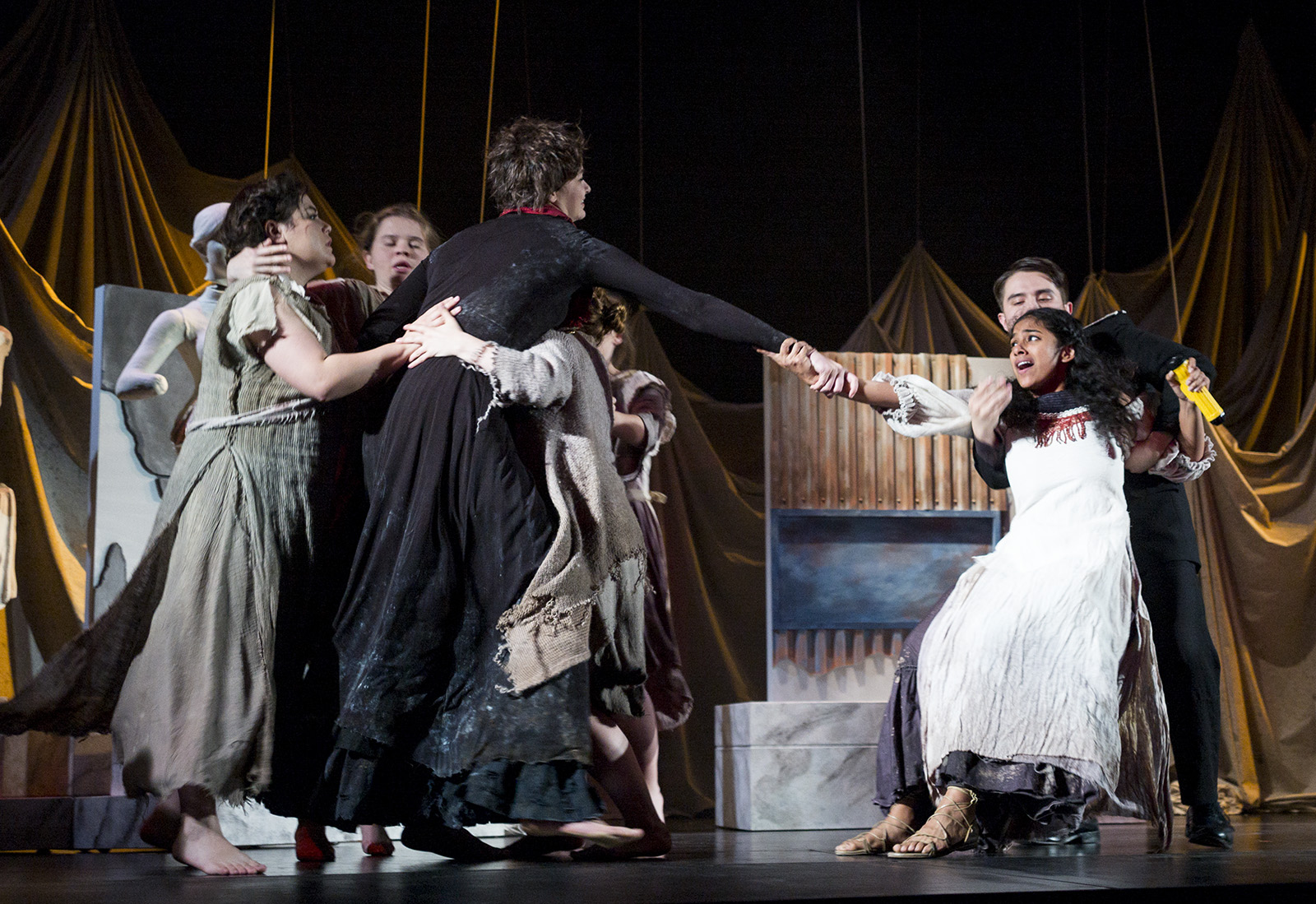Modern version of Greek classic aims to highlight future of women

“Trojan Barbie,” inspired by Euripides’ classic “The Trojan Women,” features a primarily female cast of UCLA students who re-enact the travesty of war across various eras. (Quanzhao “Ari” He/Daily Bruin)
By Sage Bitter
Dec. 1, 2017 12:21 a.m.
The cast and crew of “Trojan Barbie” prepared for their first dress rehearsal on a stage littered with dismembered doll parts.
Directed by Beth Lopes and written by Christine Evans, “Trojan Barbie” is a reinvention of Euripides’ “The Trojan Women” starring a cast of primarily female UCLA students. The play tells the story of Lotte, a British dollmaker on vacation in modern Troy. While on holiday, Lotte unintentionally enters a women’s war camp of the past and becomes entrenched in the lives of women during the ancient Trojan War. “Trojan Barbie” takes Euripides’ classic across two alternate eras while focusing on the legacy of women through history, Lopes said. After two months of rehearsal, UCLA’s main-stage fall production will debut Friday in the Little Theater.
Lopes said she was drawn to the play because of the optimism it presents, unlike the original story of “The Trojan Women,” which is bleak from start to finish. “Trojan Barbie” highlights the hope for a better future for the next generation of women, she said.
“(Evans’) version gives you a lot more hope throughout,” Lopes said. “It feels like there’s an ancestry of women and that maybe things that are hard now won’t be as hard for women in the future.”
Lopes said she made a conscious decision to avoid providing an explicit time and place for the action while designing the show, thus avoiding any blatant contemporary connection and allowing the audience to draw their own conclusions about the story’s setting. The focal point of the set, a large heart sculpture, hangs above the stage without giving any indication of location, something Lopes said is important to show how war has affected women from multiple historical periods regardless of time period.
“Unfortunately this play will always resonate,” Lopes said. “‘Trojan Women’ has survived so many years and adaptations because we continue to find resonance in these stories of war-torn countries and what’s left behind.”
Fourth-year theater student Sionne Elise will play the protagonist Lotte, a modern character who is dragged into the world of ancient Troy by a soldier from the past. Elise said Lotte represents the Western countries’ ability to turn a blind eye to the suffering in other parts of the world.
Lotte’s obliviousness toward the perils of the women in the ancient war camp is especially evident in the play’s use of dolls – similar to the ones Lotte fixes in her shop – instead of an actor to represent a child in the war camp. The inanimate object forces the audience to see the child as a doll, just as Lotte does.
“A whole part of the play is that these dolls aren’t real and that’s something the audience can take away,” Elise said. “They have real lives and they’re living these tragic moments we need to pay attention to.”
Fourth-year theater student Katie Schindelheim, one of 10 female and five male student cast members, portrayed a member of the traditional Greek chorus along with three other actresses, who all served as the attendants of a war camp matriarch named Hecuba.
Schindelheim said her role as a chorus member was physically intensive and demanded the synchronization of movement and voice, which resulted in a strong bond with the other women in the chorus. Their physical support came to the stage in a choreographed moment when the chorus lowers a grieving Hecuba methodically to the ground, leaving the five actresses huddled on the floor.
“It’s been really interesting to work with this many women because there’s not really that many opportunities for an all-woman cast,” Schindelheim said.
Lopes said she believes “The Trojan Women” has survived through various adaptations because of the timelessness of the story, which seeks to highlight women left behind throughout history. The stories continue to resonate because of commonalities today and in the past, she said.
“(Lotte) has this legacy she’s connected to that’s female, and to me, the end of the play is both about the comfort of that connection and the responsibility,” Lopes said. “You’re now living a life they couldn’t live, so what are you going to do with it?”


